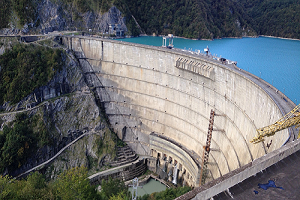Primitivism as a Trait of Georgia’s Modern Economic Policy
By Vladimer Papava
May 4, 2017, the CACI Analyst
During the 2012 and 2016 electoral periods, the ruling Georgian Dream (GD) issued numerous pledges to its voters, including economic guarantees that garnered special attention but nevertheless could not be implemented for several reasons. The GD government’s economic policy has sustained some successes but also reflect features of economic primitivism – simplistic and populist economic policies – that risk hampering the evolution of Georgia’s economy from a consumerist to an innovation economy.

Keeping the Adversary’s Lights on: Enguri Dam and Electricity Politics in Georgia
By Theresa Sabonis-Helf
March 13, 2017, the CACI Analyst
The critical but aging Georgian hydropower facility of Enguri is currently closed and under inspection, likely in urgent need of repairs. The facility serves both Georgia and Abkhazia, with portions of the facility located in each territory. Existing agreements compel Georgia to keep the lights on in Abkhazia – for free – in return for Abkhazia's (and Russia's) continued acknowledgement Georgia as the owner and operator of the facility. With Abkhaz consumption continuing to rise, Georgia is increasingly questioning how much it should be willing to do in order to maintain control of its largest power plant.

Trade, economy, and pro-Russian opinion in Georgia
By Tomáš Baranec
October 2nd, 2015, The CACI Analyst
According to a recent survey by the U.S. National Democratic Institute, support for membership in the Russia-led Eurasian Economic Union (EEU) has doubled in Georgia since 2014, to 31 percent. Simultaneously, support for the trade agreement between Georgia and the EU fell from 80 percent before the Ukraine crisis to 68 percent in April 2015. Many commentators have linked this development with a temporal disappointment among Georgians with the country’s slow western integration following the Eastern Partnership (EaP) summit in Riga. Others stress the Russian “soft offensive” on Georgia conducted through Russian-sponsored media and NGOs. However, the underlying reasons for why increasing numbers of Georgians become receptive to demands for reorienting the country towards Russia may be deeper, less temporal and much more serious.
CACI Analyst, April 15, 2015
Contents
Analytical Articles
CHINA AND PAKISTAN PREPARE TO ESTABLISH ECONOMIC CORRIDOR, by Ghulam Ali
DAGESTAN'S INSURGENTS SPLIT OVER LOYALTIES TO CAUCASUS EMIRATE AND IS, by Emil Souleimanov
GEORGIA'S ECONOMIC CRISIS AND POLITICAL BRINKMANSHIP, by Ariela Shapiro
THE CHINA-ARMENIA DECLARATION AND BEIJING'S PROSPECTS IN THE SOUTH CAUCASUS, by Eduard Abrahamyan
Field Reports
GEORGIA'S FORMER DEFENSE MINISTER BLAMES GOVERNMENT FOR DAMAGING STATE INTERESTS, by Eka Janashia
ARMENIA-EU RELATIONS ENTER A NEW PHASE, by Erik Davtyan
AZERBAIJAN AND THE IRAN AGREEMENT, by Mira Muradova
KYRGYZSTAN MARKS FIFTH ANNIVERSARY OF REVOLUTION, by Arslan Sabyrbekov
The Challenges to Georgia's Energy Sector
By Ariela Shapiro (05/27/2015 issue of the CACI Analyst)
In April 2015, Georgia’s Ministry of Energy (MoE) officially presented for review the International Energy Agency’s (IEA) Energy Policy Review of Countries in Eastern Europe, Caucasus and Central Asia, which details Georgia’s energy strategy, achievements and recommendations for future policy recommendations. This policy document aligns with the Georgian Government’s updated energy strategy and recommends Georgia to increase its energy security through utilizing its renewable energy potential, upgrading its energy infrastructure and diversifying supply via interconnections with neighboring countries. The document inadvertently highlights existing security gaps in Georgia’s energy sector. Given Georgia’s geopolitical realities and critical reliance on neighboring countries for energy, the current administration faces multiple challenges to building a self-sustaining and secure energy sector capable of meeting both local consumer needs and projected export obligations.







